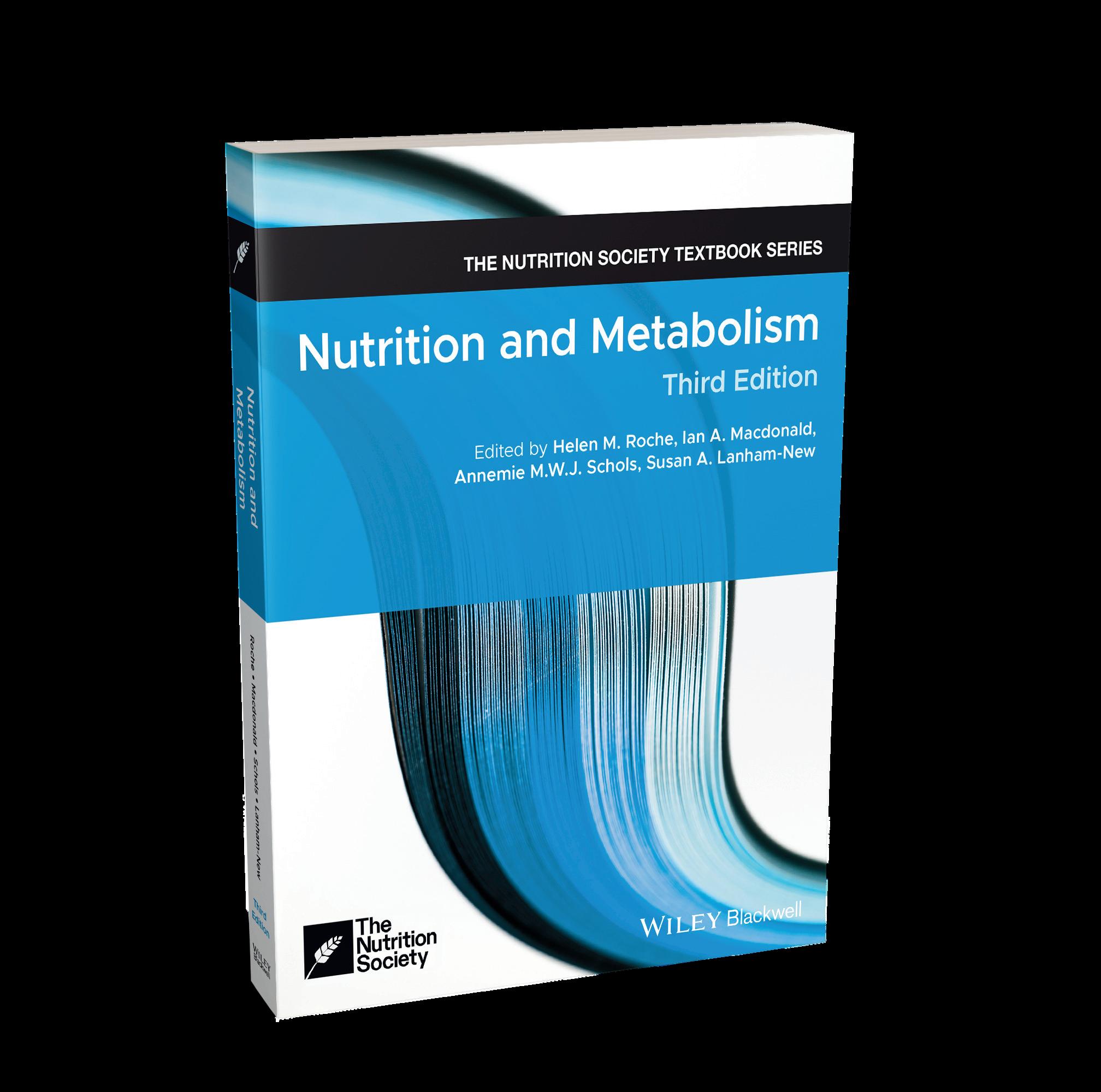The Gazette
Impact factor, Open Access, Scope, Cost… but where does reputation fit in?
New Early Career Member Section
Low-calorie sweeteners: where does the research go from here?


Impact factor, Open Access, Scope, Cost… but where does reputation fit in?
New Early Career Member Section
Low-calorie sweeteners: where does the research go from here?

President’s Report, 4
CEO Update, 5
Financial Update, 6
Honorary Fellow Reflection, 7
Impact factor, Open Access, Scope, Cost… but where does reputation fit in?, 8
Membership Matters, 9
Anne Prentice, CBE, 10-11
Ask the Expert, 12-13 Obituaries, 14-15
Highlights from the Irish Section, 16
Secial Interest Group Update, 16
Nutrition Society Academy, 17 FareShare, 18-19
All-Party Parliamentary Group, 20 -21
Association for Nutrition, 22 Academy of Nutrition Sciences, 23
Highlights from the Student Section, 24-25
Theme Leads Update, 26-27

In the words of a song from my favourite musical, Phantom of the Opera, it’s “time to say goodbye”. The six years of my Trustee role have raced by and it’s the right moment to pass on the baton to a new Gazette Editor.
Editing the Gazette has been one of my favourite jobs while serving as Trustee for Strategic Communications and has been a unique opportunity to explore new ways of celebrating our members, past and present. Starting with Sir Kenneth Blaxter, the ‘Nutrition Greats’ section was introduced to pay tribute to our founding Trustees and other key players from the past who were instrumental in building Nutrition into the scientific discipline it is today. The “Postcard from …” series was inspired by meeting Dr Manana Stanley, President of the Georgian Nutrition Society, in 2019 who told me about the challenges of starting a new Society. It made me curious about the stories of other nutrition scientists working around the globe, so we went on to publish letters from Nigeria and Japan. Another new section was “A day in the life of ...” where we invited different members to write about their work in animal nutrition, academia, industry, sport and even the fire service! We also sought contributions from external organisations, such as IGD, and members’ articles on current topics including folic acid fortification and sweeteners.
The current issue is as varied as usual. As well as important updates from the President, Trustees, Sections and CEO, who all work so hard to deliver the Society’s charitable objectives, we bring you news from our Theme Leads, SIGs, fellows and partner organisations as well as an article on the valuable work of Fareshare. While we mourn the passing of two notable members, we celebrate the successes of others, one of whom received a CBE. I hope the Gazette will continue to evolve and act as an inspiring showcase for our diverse activities. We are all heirs to this historic organisation and are responsible for taking it forward to benefit future generations of nutrition scientists.
Registered Office: Boyd Orr House, 10 Cambridge Court, 210 Shepherds Bush Road, London W6 7NJ
Nutrition Society Gazette © 2024 The Nutrition Society.
Editorial Board:
Dr Carrie Ruxton, Freelance Dietitian and Trustee for Strategic Communications
Cassandra Ellis, Nutrition Society
Design: Juliette Gouaille, Nutrition Society
Photography: Richard Murgatroyd Photography
Founders:
Sir Joseph Barcroft, Chairman of the Food Investigation Board; Dame Harriette Chick , Head of the Division of Nutrition, Lister Institute; Professor J. C. Drummond, Scientific Advisor to the Ministry of Food; Dr John Hammond, Animal Research Institute, Cambridge; Dr L. J. Harris, Director, Dunn Nutritional Laboratory, Cambridge; Sir Frederick Hopkins, Professor of Biochemistry, Cambridge; Professor H. D. Kay, Director, National Institute for Research in Dairying; Sir Charles Martin, lately Director, Lister Institute; Sir Edward Mellanby, Secretary, Medical Research Council; Sir John Boyd Orr, Director, Rowett Research Institute; Professor R. A. Peters, Professor of Biochemistry, Oxford.
Professor Mary Ward, President
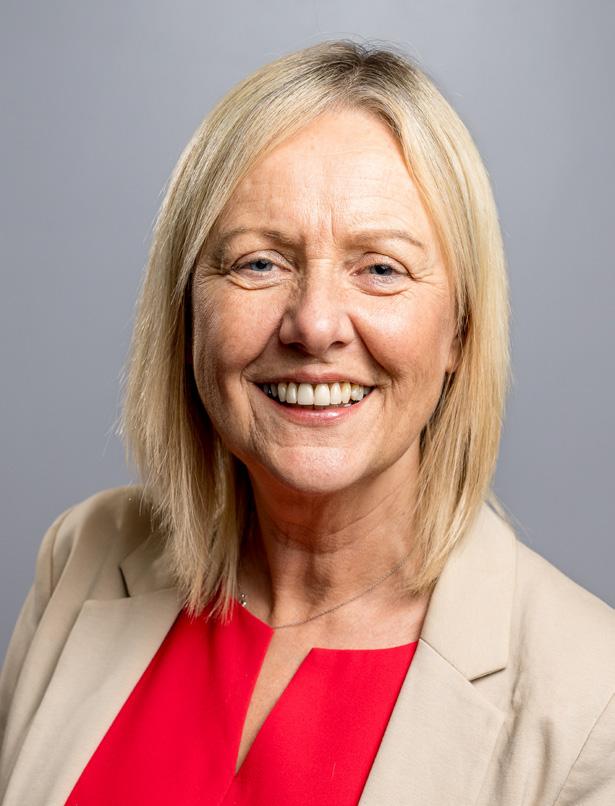
Following another highly successful FENS meeting in Belgrade, the annual Winter Conference, which uniquely was the second to be hosted in 2023 before moving to a January time-slot in 2025, brought a very busy year of events for The Nutrition Society to a close. The conference attracted almost 300 delegates and we were delighted to welcome a number of student groups, including 20 Spanish students and faculty staff from University of Navarra, who are now becoming regular attendees at the conference. Congratulations to Dr Eirini Dimidi from King’s College London, who delivered an excellent presentation to close Day One, having been awarded the Cuthbertson Award, which recognises early career researchers who have demonstrated excellence in clinical nutrition. I would again encourage all members, to consider the numerous award opportunities offered by the Society, recognising excellence in Nutrition science across all career stages. This year’s Senior award was awarded to Professor John Cummings, who delivered the Widdowson lecture for his pioneering work on carbohydrates, dietary fibre and gut health on the evening before the conference at the annual reception. During the two-day Winter Conference, we were also very pleased to launch the eagerly awaited third edition of our Nutrition and Metabolism textbook, updated by a team of internationally renowned experts and edited on behalf of the Society by Professors Helen Roche,
Ian Macdonald and Annemie Schols, under the guidance of our EIC, Professor Sue Lanham-New. Next up we are proud to announce the first edition of our Animal Nutrition textbook, which will bring our peer-reviewed textbook series from six to seven. A huge thanks to all those who contribute to this excellent series and of course our publishing partners Wiley-Blackwell.
In February I attended the Postgraduate Conference in Athlone, Ireland. In addition to the short presentations by our talented student members, the programme also incorporated the Irish Section Postgraduate Student Competition. The very worthy winners, who gave outstanding presentations, are not only given the opportunity to publish their paper in the Proceedings of the Nutrition Society but are also invited to contribute a webinar to the Nutrition Society Academy, which facilitates much wider reach and has the potential to impact a much larger global audience. The Scottish Conference followed in April where we enjoyed an excellent programme of local and international speakers on the intriguing topic of Circadian Rhythms in Health and Disease and of course wonderful hospitality in Aberdeen. A sincere thanks to all of our local organising committees and indeed everyone involved in ensuring the continued success and high calibre of our scientific meetings. Looking forward, we are very excited about launching our new Congress-style Summer Conference in Belfast in July where I look forward to meeting many of you. Plans are at an advanced stage with a terrific programme of oral and poster sessions, symposia and social events, including our congress dinner at the beautiful Titanic Centre.
Since I communicated last, we have had two very busy meetings of our Board of Trustee supported by the Advisory Council, where we had the opportunity to consider our strategic direction as well as discuss and review developments across all of the Societies activities. I am particularly pleased to share that we will soon be launching a new Early Career Section for our members with some exciting opportunities for ECMs to consider so watch this space. I am also delighted to note that 247 members from the Pakistan Nutrition and Dietetics
Society have joined us as part of the new Affiliate Member scheme. I look forward to this strengthening our links with our colleagues in Pakistan, and hopefully to meeting many of you over the coming years. In relation to our Trustees, I would like to take this opportunity to offer my sincere thanks to a number who are stepping down including, Dr Carrie Ruxton who is coming to the end of very busy six-year term in office as Strategic Communications Officer and Editor-inChief of the Gazette. We are grateful to Carrie for her considerable contribution, which she brought with great passion, energy and enthusiasm and to Honorary Officer Dr Anastasia Kalea who completes a three-year term of office in July. Your support and guidance is much appreciated. We look forward to welcoming new Trustees following the summer elections.
Finally, it is with a heavy heart that I acknowledge the untimely passing of two of our esteemed members who made outstanding contributions to the Society throughout their careers, Professor Graham Burdge, previous Editor-in-Chief of the British Journal of Nutrition and the Journal of Nutritional Science who passed away on the 1st February and Professor Mike Gibney, first Chair of the Irish Section and Past President of the Society on February 23rd (you can read both obituaries on pages 14-15). I offer my sincerest condolences to both families, including our own Trustee Professor Eileen Gibney, and to their many friends who will miss dearly, may they rest in peace.
Mike held a particular place in my heart as an inspiring lecturer during my undergraduate studies at Trinity College Dublin, a mentor and role model throughout my career and most importantly a treasured friend (along with his wife and lifelong partner Jo). I was truly honoured that he attended the Summer Conference in Liverpool last July to see me proudly assume the role of Society President from Professor Julie Lovegrove and am hugely grateful for his support and guidance down through the years. My fondest memory from the conference was sharing an aperitif with Mike and his lifelong friend Professor Sean Strain (both Past Presidents) just before, what we know now to be his final gala dinner.
Mark Hollingsworth, CEO

One of the pleasures as CEO comes when I have the opportunity to enjoy conversations with the members. Over the recent years those conversations consistently start with the member, particularly if they are a member of longstanding, remarking on how much the Society has changed over the past 10 years. But, if I reflect on these past years since I became CEO (1st July 2014), I do find it difficult to determine how those changes have taken place. In my mind change has evolved, rather than any specific major change taking place.
How then can we keep our much-loved Society on this evolutionary path?
I recently read a book, ‘Atomic Habits’, written by James Clear. He suffered a traumatic accident as a young man, and describes his greatest discovery on his recovery journey as: the power of

small habits in creating lasting changes in one’s life. He demonstrates that real change comes from countless small decisions that cumulatively have a major impact. On that journey to major change, one is not really conscious that something profound is happening, until it in fact becomes the norm.
I sense that it is what has happened with our Society. Led by our fabulous Board of Trustees, a number of small strategic decisions have been made, which as a single action were not profound, but cumulatively year after year through a robust strategic planning process, have resulted in evolutionary change.
As you read this article, we will have just announced another strategic decision, not of massive change, but now requiring a number of incremental change decisions which will have a long-term positive impact on the sustainability and future of the Society. That decision is to create a new Section, to join the Irish Section, Scottish Section, and Student Section, for Early Career Members - The Early Career Member Section. The decision two years ago to create this category of membership was not particularly profound, but it did provide recognition to those who are still within 10 years of their most recent graduation, and have committed to join the Society and follow its mission. That creation has seen the fastest growing category of membership in the Society. The decision to give this cohort Section status, and a collective voice, is evidence of another small decision on that cumulative journey.
A further decision was made to appoint the Chair of the Section, and its first committee of six members, from volunteers rather than by calling an election from within the Section. Whilst not entirely democratic, it will provide the section with the strongest possible leadership from day one, and a chance to establish its democratic processes to then sustain it over the long term. I’m delighted that Dr Oliver Shannon, from Newcastle University, has enthusiastically accepted the role of Chair for the first three years.
Returning to my Atomic Habits concept, I would predict in six years time cumulative small actions of creating an Early Career Membership category, awarding it status as a Section, appointing a fantastic leadership team to lead it in its first three years, introducing elections to sustain its growth, will see the Section producing the largest cohort of membership, future Trustees and leaders of the Society, and being the centre of a globally connected hub of early career nutritionists.
Change, I suggest, requires leadership, vision, a sound decision-making model, effective governance, and an amazing group of people who come together under the membership of The Nutrition Society. They commit to small, yet progressive, actions to making it a sustainable, relevant, contemporary, world-class example of a scientific learned Society.
“I am an early career researcher and lecturer in Human Nutrition & Ageing at Newcastle University, and I am delighted to accept the role of Chair for the newly created Early Career Member (ECM) Section of The Nutrition Society. I aim to help shape the new ECM section to ensure the needs of our ECMs are fulfilled, and to provide them with opportunities to develop the skills, experiences and networks crucial for this stage of their career.”
Dr Oliver Shannon, Newcastle University
Tom Hill, Honorary Treasurer

It seems like quite a journey since I stepped into the role of Trustee and Honorary Treasurer 18 months ago. Reflecting on this time, I am filled with gratitude for the enriching and inspiring experiences it has brought. Our Trustee meetings are more than just discussions; they are reminders of the critical role effective financial management plays in realising our strategic goals and nurturing the diverse activities that define our Society.
As custodian of our finances, I have been fortunate to have excellent support from our CEO and Finance Manager. Together, we have forged a strong team committed to ensuring sound financial stewardship. In our quest for continuous improvement, we recently introduced a fresh approach to budget management. A Finance Committee, chaired by our Finance Manager, with members including our CEO, Science Director, and Science Manager, and myself serving as an ex-officio member. This committee convenes monthly, reviewing our financial position including cash flow and projected monthly budget.
The recent financial audit and site visit by BWM Accountants in March 2024 was a reassuring validation of our financial position, highlighting no major concerns. Their findings were encouraging, noting, in key budget lines, a 10% increase in income and a 3.8% reduction in expenses for 2023 compared to the previous year (2022). I will share the comprehensive income and expenditure figures for 2023 at our upcoming Annual Charity Meeting at the Society Congress in Belfast this July which I hope many of you will attend. Our investment portfolio has performed well so far in 2024, with its value reaching £458,163 as of April 8th, marking a commendable growth rate of 5% in the first quarter alone. Furthermore, negotiations with Coutts, the Society’s bank, are underway to optimise the terms of our bank loan, underscoring our commitment to financial efficiency.
Our reliance on journal income remains substantial, yet uncertain due to the evolving publishing world, and projected to constitute 68% of total revenue for 2024 (£960,422). This income funds most of our strategic and operational activities and we continue to engage with our publishers, Cambridge University Press, regarding the financial terms of our contract with them. Efforts to diversify revenue streams are now very important, and are also gaining momentum. Working closely with our CEO, I am exploring avenues to expand our income sources; including leveraging our newly acquired ‘Gift Aid’ status and embarking on targeted fundraising campaigns. Additionally, innovative initiatives such as CPD endorsements and branded merchandise promise exciting opportunities for revenue generation. In 2023, we developed a new supporter’s policy, informed by valuable member feedback, and we are beginning to see some benefits already with steady, carefully curated, sponsorship arriving for our Congress in July.
So in summary, with a solid financial footing, robust reserves, and a proactive approach to explore revenue diversification, our Society stands resilient against any short to medium term fluctuations in its revenue and costs. ‘Not resting on our laurels’ has been my own personal mantra over the last 18 months and I strongly believe this is going to be important as we chart a course of financial sustainability over the longer term.
Save The Date - Your Calendar For 2024/25
Nutrition Futures
12th-13th September 2024, London, UK
Winter Conference
Dietary guidelines and advice - current and future 21st-22nd January 2025, London, UK

Professor Chris Seal

What attracted you to nutrition science?
My undergraduate degree was a blend of physiology and biochemistry giving a perfect broad background for understanding nutrition principles. I wanted a career with a strong practical focus, so nutrition science was a natural choice all round.
How did your early career develop?
Like many graduates in the 1980s (and now!) my early career was driven by a series of short, fixed-term contracts relying on the availability of external funding. Teaching was always a focus for me; my first job was a three-year Demonstrator position in the Department of Agricultural Biochemistry and Nutrition (ABN) where I ran lab classes and taught basic nutrition to the animal nutrition students. At the same time, I learned and developed skills in farm animal nutrition research mentored by David Armstrong (President 1986-1989) and David Parker. For the next eight years I worked as a Research Associate and then Senior Research Associate on projects funded by the Agricultural Research Council, Agriculture and Food Research Council and the BBSRC as the funding landscape changed. Fortunately, the Northern and Yorkshire Regional NHS awarded the University funds to
establish the Human Nutrition Research Centre (HNRC) and I persuaded John Mathers (President 2001-2004) and Andrew Rugg Gunn (Co-Directors of the HNRC) that animal nutrition expertise could translate to human nutrition (as John was himself already demonstrating). The research and teaching emphasis of the department (then called Biological and Nutritional Sciences) also changed to focus on food and human nutrition and in 1997 I was awarded my first ‘permanent’ contract when I was appointed as Lecturer in Food and Human Nutrition.
Has there been a study or project that you have worked on that you would now consider to be a defining point in terms of your career?
The WHOLEheart Study was the first large grant I received from the Food Standards Agency in 2005, and was the first and largest dietary intervention study carried out world-wide to investigate the impact of increased whole-grain consumption on CVD risk. The study started a career-long interest in understanding the health benefits of whole grain, promoting whole-grain intake and developing global definitions of whole grain and whole-grain foods. We also learned a lot about running dietary interventions, hugely important for nutrition research.
What has been the most rewarding, or challenging, part of your work?
Transfer of knowledge is key to expanding our discipline, so developing teaching and learning strategies for undergraduates and postgraduates is crucial and challenging. The reward is seeing the joy of family and friends at graduation celebrations.
In your opinion, how has the field of nutritional science and the key issues changed since your career started?
The key issues for nutrition scientists haven’t changed much in the past 40 years. We are still faced with preventing the consequences of under- and overnutrition, and understanding why people choose to eat the food they do remains difficult. Progress in understanding nutrition and metabolism has been made
largely through the development and application of new analytical techniques. Molecular biology and a raft of ‘omics’ now underpin nutrition research, supported by high-throughput analytical methods. Tying this information together with complex statistical analysis is now commonplace and becoming more accessible with the advent of new AI methods driving a systems approach to nutrition research. Remote monitoring and population-scale studies are an exciting development I wish I had been able to use.
How has being a member of the Society impacted your career?
I joined the Society in 1982 and gave my first oral communication as a postgraduate at the “369th Scientific Meeting of the Society” held in Edinburgh. I remember being completely terrified when the Chair, Peter Aggett, asked the audience to vote on whether my abstract was acceptable for publication in Proceedings of the Nutrition Society. My first full paper was published in the British Journal of Nutrition in 1983 just before I was awarded my PhD. I remember when the journals appeared in the University library and feeling so proud seeing my name in the index alongside leading nutritionists. Since then membership of the Society has been absolutely central to my career. I consider myself privileged to have been a Member of Council, Founder and Secretary of the Animal Nutrition Group, Programmes Officer, Scientific Development Officer and Treasurer. I hope that my contributions have helped disseminate knowledge and maintain the quality and professionalism of our science. Meeting members, now good friends, at the Society’s conferences is a joy but also a great reservoir to draw on for knowledge and advice, always gratefully received.
There are many factors to consider when deciding which journal is most suitable for your research: journal scope, journal-level metrics, reputation, cost to publish, whether it is open access or not - the list goes on. But should we also be considering who owns the journal and what this might mean?











Journals can be owned by commercial organisations, for-profit and not-for-profit publishers and learned societies. For learned societies, journal publishing is a key activity to support the academic discipline they represent, and also a key source of revenue. For many societies, their main source of income is from academic publishing. However, what sets societies apart from for-profit journals is the investment of any surplus into supporting their strategic missions.
This is no different for The Nutrition Society. Originally starting with the Proceedings of the Nutrition Society in 1944 to record and disseminate meeting proceedings, the Society now successfully publishes six journals across the spectrum of nutrition research. Whilst our journals play an important role in facilitating scientific communication, the activities of the Society go way beyond just this, with income made from publishing invested back into the scientific community and geared towards the Society’s main aim - ‘to advance the scientific study of nutrition and its application to the maintenance of human and animal health’.
Despite diversifying our income portfolio in recent years, 70% of the Society’s income still comes from journal publishing (See Tom’s finance update on page 6). Back when libraries had big budgets and the publisher was selling consortia deals of multiple journals to universities, this was a steady source of revenue. But now, against a backdrop of cOAlition S, a global shift towards Open Access and tighter budgets, this income is less certain than before.
Publishing revenue enables us to keep membership rates low, to subsidise conferences, provide training and fund travel grants for members to attend international conferences. We also try to keep our article processing charges at a reasonable level. There are many other less tangible outputs that are financially supported by the journals, such as our influence on policy through our parliamentary work, and our support for the international nutrition community through training, grants and governance activities. None of these activities are possible without journal revenue, which is why it is my role,











with the support of the Publications Committee, to oversee the publishing contract, work with our publishing partner to ensure our journals flourish and financial and operational matters are well managed.
Not only does the Society reinvest any profits back into the scientific community, so does our publisher, Cambridge University Press. We choose to publish with a university press because any profit is reinvested back into the academic community. As a not-for-profit organisation, Cambridge University Press continually reinvests its surplus into education. This creates a virtuous cycle where the scientific community benefits from the research that is published.
Beyond finance, a Society journal is also a mark of quality as each journal has a rigorous review process, publishing only the best science. Each of our journals has an expert editorial board and reviewers who review every submitted manuscript. The editors and reviewers can be thought of as the publishing gatekeepers, responsible for evaluating the quality and validity of manuscripts, ensuring that only well-designed, scientifically sound work is published. Whilst these rigorous processes take time, they guarantee high standards are maintained and ensure the quality of what is accepted for publication.
As part of our investment in the journals, we are currently running mentoring schemes to train the next generation of reviewers and board members. We offer rewards to editorial board members to acknowledge their commitment to our journals and are looking at ways to offer rewards to reviewers to thank them for their time. This is part of our continued investment in the nutrition science community.
If you would like to know more about how you could become more involved with our journals, visit www.nutritionsociety.org or contact office@nutritionsociety.org
Professor Jayne Woodside, Honorary Publications Officer
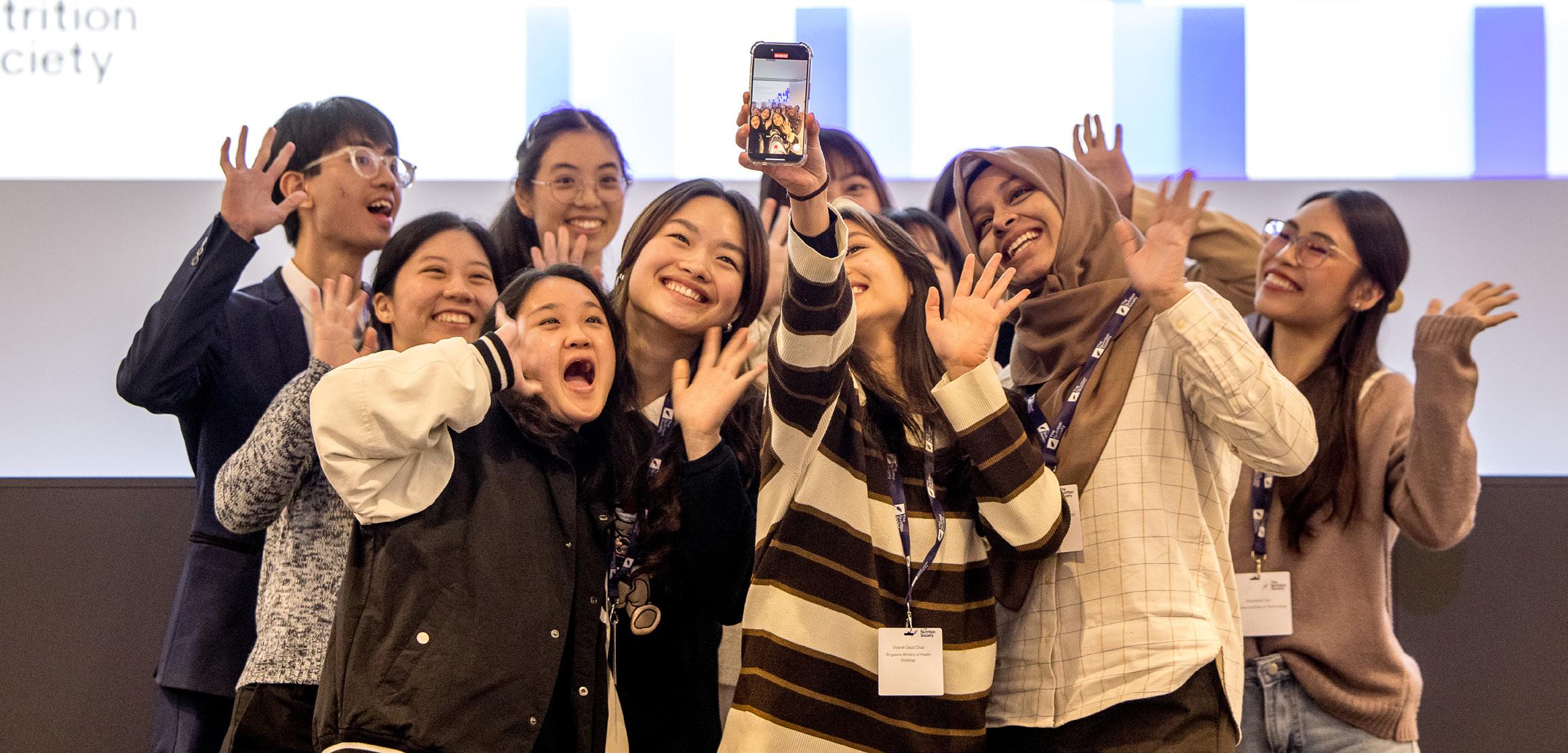
You, our valued members, are crucial to the sustainability of the Society, the raison d’etre for meetings, publications and other activities of the Society. It provides opportunities for involvement and volunteering, helping run and govern the Society to support and nurture the next generation who will keep it alive and relevant.
When the Society was founded back in 1941 it had quite a different governance structure, since which we have worked to ensure an open and inclusive modern structure with chances for everyone to get involved. For example, no longer are you nominated and elected to join as a member, there is an opendoor policy so you can support our world class society and contribute to its vibrant, inclusive, and global community of members.
Societies like ours, are valued and respected internationally, and the work to support developing societies as well as link with existing ones creates global links and brings wider options for our members. In recognition of this and to extend our reach further we have recently launched our Affiliate Membership scheme. In 2023 we started working on it with the Pakistan Nutrition and Dietetics Society (PNDS) and now offer free Affiliate Membership to any of their members wishing to take this up. These members will be able to access all non-financial benefits and be welcomed into our global community for conferences, webinars, and publications.
This will deepen our links with this wonderful society and we hope offer opportunities and adventures to our members. If the Affiliate Member scheme is successful, we have the option to roll this out to other organisations, thereby extending our community and our science across the world, embracing our global reach so that we, as a Society, can continue to function into the future, connecting people together around a particular activity and profession. We all know that the world has changed dramatically with advancing technologies including the advent of the internet and video chat platforms, and this means our community can grow globally; a nice example being our virtual coffee mornings for new members, where we can be sat in Hammersmith, UK, engaging with people from Sri Lanka, Nigeria, the Yemen and others across Europe, all at the same time, all looking for a community of likeminded people. As Helen Keller once said, “Alone we can do so little; together we can do so much”.
Professor
Eileen Gibney, Honorary Membership Officer Alison Barham, Membership Manager
“The Nutrition Society’s affiliate membership offer to the members of the Pakistan Nutrition Society (PNDS) brings numerous benefits. It will promote collaborative research, knowledge sharing and capacity building among nutrition professionals in Pakistan. Members will gain access to workshops, conferences, and networking opportunities, fostering a global perspective on nutrition issues. The affiliation strengthens advocacy efforts for evidence-based policies and enhances professional development, ultimately contributing to improved public health outcomes in Pakistan through the advancement of nutrition expertise and initiatives.”
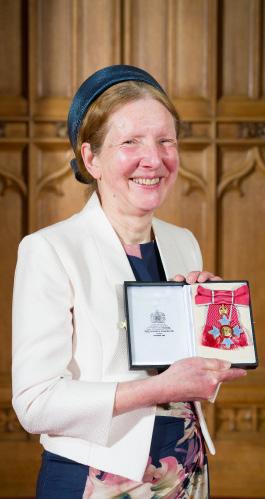
What first attracted you to nutrition science?
After my first degree in chemistry at Oxford, I wanted to move into a health-related discipline and studied Medical Physics at Surrey. Although this proved very useful later in my career, it made me realise that my real love was labbased research, and I went back to the lab and studied for a PhD in Cambridge. At that time, I often attended seminars at the Dunn Nutrition Unit and became fascinated by the detective work on human nutritional physiology that the Unit was engaged in, especially their investigations into the causes of malnutrition in Africa. After my PhD, the opportunity arose to join Roger Whitehead’s team and set up a field lab in Keneba, The Gambia, where I could use my skills in chemistry to study the breast-milk composition of mothers in that resource-poor community.
In your opinion, how has the field of nutritional science and the key issues changed since your career started?
These are two very big and interesting questions. In the late 1970’s, when I joined Roger Whitehead’s team, it was at the dawn of major technological advances in instrumentation, assay development and computing. The main research emphasis was on nutrient requirements, with a view to preventing deficiency disorders and treating famine and malnutrition, especially in infants and mothers during pregnancy and lactation. Both protein-energy and micronutrient deficiencies were under the spotlight, and new techniques, such as stable-isotope mass spectrometry and vitamin metabolite assays, were being developed to provide mechanistic insights into the underlying effects on health.
Around that time, the concept of dietary reference values was developed to provide policymakers with yardsticks to assess the prevalence of nutrient deficiencies in their populations. In the years that followed, the rapid increase in obesity throughout the world shifted the emphasis away from deficiency to excess, with the added complication that both can occur together. Along with this has come the recognition that many non-communicable diseases may be related to diet throughout life, including that of the mother during pregnancy. In addition, increasingly sophisticated technology led to a greater focus on the function of nutrients within the body, giving rise to concepts of optimal or functional nutrition for individuals rather than populations. One of the greatest changes has been the vast expansion in published research (and misinformation) on food, diet and nutrition. This has led to better study and trial design, and development of techniques for judging evidence more objectively, through statistical modelling, systematic reviews, and meta-analysis.
“The Society has been, and remains, a central part of my life as a nutrition scientist”
Has there been a study or project that you have worked on that you would now consider to be a defining point in terms of your career?
It is difficult to single out just one, because most studies are teamwork and often several lines of research are needed to produce the jigsaw pieces that fit together to reveal new understanding. An example is the series of studies conducted by Roger Whitehead and colleagues in Cambridge and The Gambia, including myself, that ultimately provided the evidence that undernourished mothers are able to produce breast milk of good quality and quantity. A defining point for me in that journey, came through my studies that demonstrated that breast milk calcium concentration is not determined by the mother’s calcium intake. This meant that I could robustly challenge paediatric advice that women with a low calcium intake should not breast-feed, as I did the first time, very memorably, at a conference in Mexico.
This experience convinced me of the critical importance of making population recommendations based on objective evidence, which has stayed with me throughout my career.
How has being a member of The Nutrition Society impacted your career?
The Society has been, and remains, a central part of my life as a nutrition scientist. When I was a young post-doctoral researcher, the Society provided the opportunity to meet researchers in my own field and in related areas such as clinical and animal nutrition who otherwise I might never come across. The Society meetings were a place to present my studies to an informed and interested audience, to share ideas, learn new perspectives and form networks and collaborations with other members. As my career developed, I was able to give the same opportunities to my PhD students and post-doc fellows, often bringing colleagues from The Gambia to share the experience. In addition, I have had the privilege of working the development of the Society and the professionalisation of nutrition on several committees, including serving as President from 2004-2007. At a more personal level, the Society and its senior members, have been hugely supportive and influential during difficult times in my career, and given me many happy memories and longstanding friendships.
What does being recognised with a CBE mean to you?
I was delighted to receive this award because it recognises, at a national level, the value of evidence-based nutritional science, however challenging it may be. For me, it is also a tribute to the many hundreds of colleagues, staff, students, and study participants who have worked with me and whose contributions are also recognised through this award. It was my great pleasure to receive the CBE in April at Windsor Castle from The Princess Royal. This felt particularly special because Princess Anne is a strong champion of nutrition science, with a keen interest in research to improve the health of undernourished mothers and children, and she has been an encouraging influence throughout my career.
“

Whilst we may be getting closer to understanding the health impacts of LCS, there remain some important gaps in our knowledge.
Following the sweeteners article in The Gazette Winter 2023 edition1, a logical next question might be, ‘so, what more do we need to know?’. Low-calorie sweeteners (LCS) remain a topic of lively scientific and public health debate, particularly with the increasing global burden of obesity and related metabolic disorders alongside widespread and apparently increasing use of these food additives.
As with all approved food additives, the safety of LCS is thoroughly investigated2 prior to introduction to the food system and intakes are well within acceptable daily intakes3 Therefore, LCS can be part of a potentially useful strategy for reducing caloric intake while still satisfying the human desire for sweetness.
State of research into LCS
Research into the health impacts of LCS presents a complex picture. Systematic reviews and meta-analyses indicate that LCS consumption is associated with modest weight reduction in adults when replacing sugar-sweetened beverages, without significant impacts on cardiometabolic risk factors in randomised controlled trials. However, observational studies often report positive associations between LCS intake and obesity or cardiometabolic diseases, though these findings may be subject to confounding factors such as reverse causation. The inconsistency in evidence may be partly explained by variations in study design, with nonrandomised studies suggesting positive associations and randomised studies showing negative or no associations. Overall, the current body of evidence underscores the need for cautious interpretation and further investigation into the role of LCS in human health.
Two large ongoing research projects, SWITCH4 and SWEET5, aim to address some important outstanding questions about LCS and early results suggest that they can be beneficial6 with respect to sustained weight loss.
However, whilst we may be getting closer to understanding the health impacts of LCS, there remain some important gaps in our knowledge. Looking ahead, several key areas merit further investigation including:
1. Long-term health outcomes: More longitudinal studies are needed to understand the long-term effects of LCS consumption on body weight, metabolic health, and disease risk.
2. Behavioural and psychological aspects: The psychological and behavioural factors influencing consumer beliefs and consumption of LCS need to be explored in greater depth.
3. Effects at various stages of the life cycle: Most research into LCS has been conducted in adults but much more evidence is required at other stages of the life cycle such as early life.
4. Policy and public health recommendations and how these are implemented: There is a need for consistent policy recommendations regarding LCS use, informed by the latest scientific evidence. Furthermore, how these recommendations are implemented should be considered in order to optimise their effectiveness.
Conclusion
For nutrition scientists, the journey ahead involves not only understanding the physiological impacts of LCS at all stages of the life cycle but also navigating the psychological, behavioural, and policy-related aspects that influence their use in our diets. "Low-calorie sweeteners: where do we go from here?" is a question that will be answered through continued research, collaboration, and an open-minded approach to the evidence. In the meantime, there seems little doubt that controversies surrounding LCS will persist.
Dr Caomhan Logue, Nutrition Innovation Centre for Food and Health, Ulster University
References
1. https://www.nutritionsociety.org/the-gazette
2. https://www.efsa.europa.eu/en/topics/topic/sweeteners
3. Martyn D. et al. Low-/No-Calorie Sweeteners: A Review of Global Intakes. Nutrients. 2018, 10(3):357.
4. https://www.hra.nhs.uk/planning-and-improving-research/applicationsummaries/research-summaries/switch-weight-management-study/
5. https://sweetproject.eu/
6. Harrold, J.A. et al. Non-nutritive sweetened beverages versus water after a 52-week weight management programme: a randomised controlled trial. Int J Obes. 2024. 48, 83–93.
My good friend, Mike Gibney, Emeritus Professor of Food and Health, University College Dublin, died after a short illness on 23rd February 2024 at his home in Blackrock, Co Dublin. Mike was an outstanding researcher and communicator and, as expected for someone of his standing, obituaries were in the Irish national press. An excellent comprehensive obituary written by Professor Christine Williams, University of Reading, details the life and scientific achievements of the man and is in press in the British Journal of Nutrition. Mike was well known and popular among members of The Nutrition Society and this tribute will rather focus predominantly on his interests and achievements with the Society.
Mike joined the Society in 1974 as a PhD student at the University of Sydney and gave his first short communication to the Society at a meeting in London in December 1976 when he had returned to Ireland to take up an Irish Postdoctoral Fellowship. Mike recognised the importance of belonging to learned societies for networking and career advancement. Not least, he appreciated the social interactions at these types of meetings and when Mike was around the craic could be mighty. His first active involvement with the Society was after he moved to the University of Southampton in 1977.
There, he acted as Assistant Programmes Secretary to Bob Grimble, now Emeritus Professor at Southampton.

I first met Mike at Trinity College Dublin (TCD) in 1985 after his move back to Ireland in 1983. His move coincided with the advance of new degrees in nutrition at University College Cork (UCC), University of Ulster (UU), and TCD. Mike, Albert Flynn, now Emeritus Professor (UCC), and I (UU) were most closely involved with nutrition in the three institutes and we met often during that time at Nutrition Society meetings or to organise research and we developed life-long friendships. Mike used to refer to us as “The Three Amigos”. Professor Gerry McKenna, then Pro-Vice Chancellor (Research) at UU convened a meeting at Coleraine in 1992 to formalise the relationships amongst the nutritionists at the three institutions and we formed the Irish Universities Nutrition Alliance (IUNA). The IUNA was a great success in earning research income and is still in operation today.
Mike was instrumental in establishing the Irish Section of The Nutrition Society in 1988 when he became its first Chair. One of his initiatives was the highly successful Postgraduate Student Conference, which continues to run annually through the Irish Section.
Undoubtedly, a highlight of Mike’s career was becoming the 19th President of the Society. He celebrated at the 1995 Aberdeen Summer Conference in his inimitable style. On becoming President, he set up a task force, the successful outcomes of which were to have a greater international presence, particularly in Europe, to foster Public Health Nutrition, including the launch of a new Society Journal of the same name, and to establish a register of nutritionists. He said his greatest achievement as President was the establishment of a suite of Nutrition Society Textbooks, which have flourished and expanded under the capable hands of the Editor-in Chief, Professor Sue Lanham-New from the University of Surrey.
One of Mike’s many attributes was his excellent communication skills and writing, in particular, came easily to him. As well as a prodigious record of research publications and successful research grants, he wrote nutrition articles and books for the non-specialist; the final book completed just days before his death.
Mike’s move to University College Dublin (UCD) with a team (23 people) in 2006 caused quite a stir at the time but his final seven years of employment at UCD were very productive. Another Gibney researcher of international renown, his daughter, Eileen recently filled the post he vacated on retirement in 2013. Eileen is also an active member of The Nutrition Society and played a leading role in the Irish Section. The involvement of the Gibney family in the affairs of The Nutrition Society extend to his beloved wife, Jo, who used to help on the desk at Nutrition Society meetings in the days before the appointment of professional staff.
Jo and their children, Michael, Eileen and Sinead will greatly miss him, as will the remaining two Amigos who have lost a dear friend. Other members of the Society will miss him too as he was hugely inspirational to so many and in so many ways during a life well lived.
Professor Sean Strain
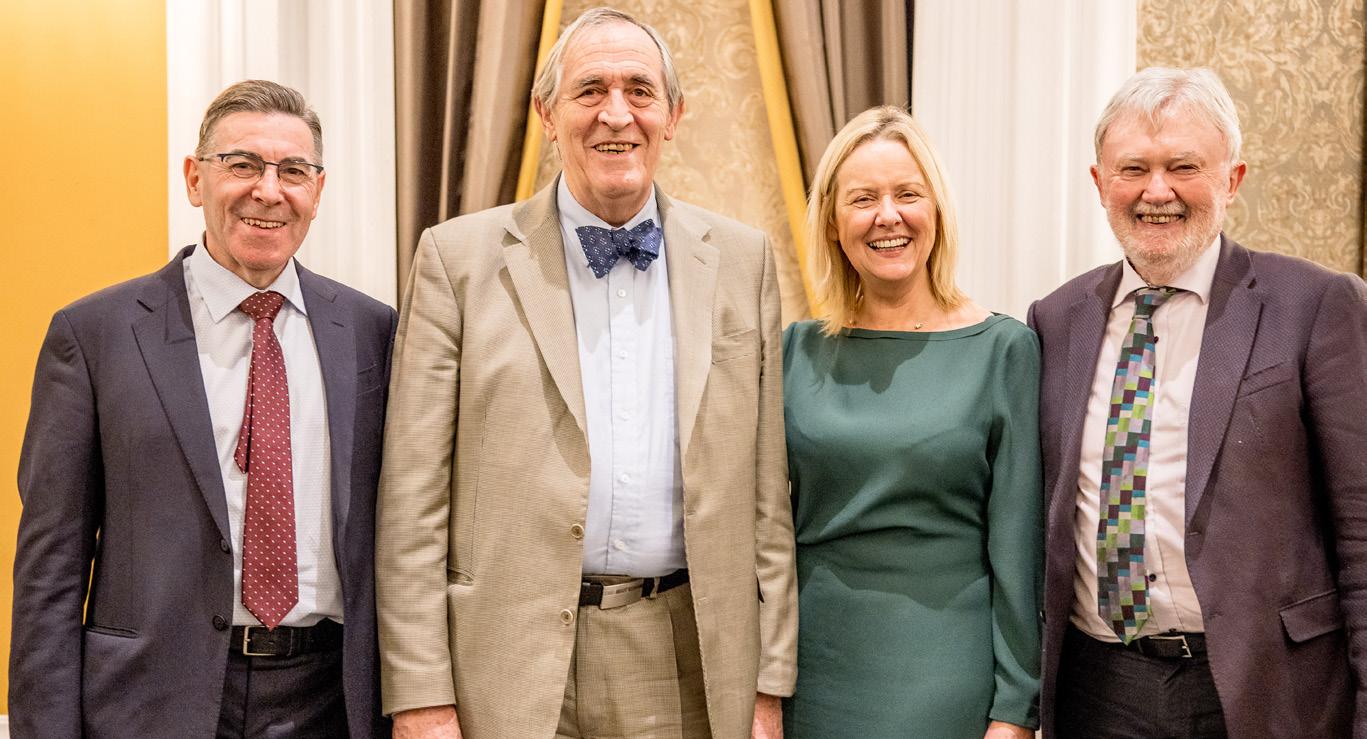

Professor Graham Burdge passed away at home on 1st February 2024. He was 60 years old. The discipline of human nutrition lost a leader who had made a number of important contributions. Graham worked in the Faculty of Medicine at the University of Southampton almost continuously since November 1989, a tremendous record of service.
Graham was an excellent scientist; he embraced new technologies and he conducted important research. His work is well recognised within the nutrition community, and his papers are well cited by others. Graham was regularly listed as a Highly Cited Researcher, a clear recognition of the academic impact of his work. Beyond research, Graham held many roles in education, administration and management within the University of Southampton, many of these behind the scenes. Graham was a great supporter of The Nutrition Society which he joined in 1999, and he held the position of Editor-in-Chief of the British Journal of Nutrition and the Journal of Nutritional Science from 2013-2018.
Scan the QR Code to ready the full obituary by Professor Philip Calder in the British Journal of Nutrition


Dr Yvonne Brogan
The Society was deeply saddened to hear of the passing of another long-standing member, Dr Yvonne Brogan, who passed away suddenly in December 2023.
The much anticipated inaugural Nutrition Society Congress 2024, was hosted by the Irish Section and we were delighted to see so many of you in Belfast. The Congress took place at the Assembly Buildings, Belfast from 2nd-5th July. The theme focused on Nutrition Science in 2024: new data-focused approaches and challenges. The local organising committee, co-chaired by Professor Jayne Woodside and Dr Anne Nugent at Queen’s University Belfast, developed an exciting programme and a thoughtprovoking first meeting.
The 33rd Irish Section Postgraduate Conference took place in Athlone from February 21st-23rd with 74 delegates in attendance. Our hosts were local student organisers, Ciara Goland, Miriam Murphy, Omid Eslami and Jennifer Whelan from the Technological University of the Shannon, along with academic organisers Dr Trish Heavey and Dr Geraldine Cuskelly. We congratulate them on a varied and interesting programme, and a fantastic opportunity for connecting, networking and socialising that included 35 postgraduate presentations, four careers talks and presentations from the four winners of the Irish Section Postgraduate Competition. The Irish Section Postgraduate Conference is open to any student members from across the Society to participate, and is always an annual highlight for our student members.
It was with great sadness that the Irish Section members learned of Professor Mike Gibney’s death, which coincided with the final day of our Postgraduate Conference. Mike was the first chair of the Irish Section, which was established in 1988, and he, along with Professor Albert Flynn from University College Cork and Professor Sean Strain from Ulster University, founded the Postgraduate Conference in 1992. In his 2018 Annual Review of Nutrition article, Mike described the Postgraduate Conference thus: ‘The annual postgraduate conference is a must in everyone's calendar, for this event is 100% owned by the graduate students on this island. They rotate the venue, raise money, allocate time slots for short and long oral communications, and bring in many past pupils for career talks. And they party!’* In the same article Mike described his work on collaboration across the island of Ireland as one of his proudest legacies. The Postgraduate Conference is a living testament to his impact in this regard.
We will all miss him dearly. Rest in peace Mike.
MJ. A

In November 2023 the Global School Health and Nutrition and School Food Systems Special Interest Groups joined forces to deliver a symposium at the Federation of European Nutrition Societies (FENS) conference in Belgrade, sponsored by The Nutrition Society. The session was entitled “School food programmes and impact on future health and well-being: global perspectives”. Dr Robert Akparibo, University of Sheffield and chair of the Global School Health and Nutrition SIG, chaired the session but also spoke on the topic of scaling up school food interventions in the global south. Professor Jayne Woodside from Queen’s University Belfast took a different perspective, summarising the evidence for the impact of the UK free school meals policy on children’s health and well-being, including recent changes such as the different scales of universal free school meals roll-out being seen regionally. Professor Maijaliisa Erkkola from the University of Helsinki then outlined the importance of school food for well-being and learning, giving the perspective and evidence from Finland.
Discussion then followed in the well-attended session. School feeding programmes are vitally important given that children’s food intakes while at school are a major contributor to overall dietary intake, and eating habits in childhood impact on dental health, growth, malnutrition (both over- and under-nutrition as well as micronutrient status) and associated physical, mental and emotional status. School meal provision, and the impact of it, does, however, vary across the globe and will depend on social, economic, conflict, food system and child vulnerability factors that will be unique to a particular country or region. Healthy and well-nourished schoolchildren learn better, while dietary habits during childhood and adolescence are likely to persist into adulthood. Therefore, we need effective and sustainable ways to help young people, particularly in areas of socioeconomic disadvantage, access a better diet.

As members, you will be familiar with the Nutrition Society Academy’s webinar platform, dubbed as the ‘Netflix for Nutrition’. The Academy, as with the Society, ensures that credibility and evidence-based nutrition are at its core. We only host the latest in nutrition research, from world-leading experts.
We are driven to power up your career and accelerate the impact of your research. We know that early career researchers are at the heart of the latest research outputs, so we cannot wait for you to be a part of the Academy’s offering.
As an early career researcher, we know that it can be difficult to break through and know where to disseminate your work credibly and effectively. Our webinar platform has a catalogue of nine channels, with over 80 topical webinars, meaning all research areas have a spot. As well as the stage to present, you will be engaging with a subscription demographic of nutritionists, dietitians, healthcare professionals and medics, from across the globe. You will also be assured that you are supporting the next generation through their studies and careers, without them always needing to budget for in-person conferences.
Sign me up!
Applying is quick and easy, and you will hear back within two weeks as to whether you have been accepted to present for the Academy. Once accepted you will record your content at a time convenient to you. After which you can update your CV with details of presenting for The Nutrition Society. At the Society, we promise to promote your research to our 100,000 followers across social platforms and bulletins, making you a part of the home of evidence-based nutrition.
Ready to apply?
Apply via: https://nutritionsociety.academy/instructor-application/
If you have any queries or want to discuss your application, contact us at academy@nutritionsociety.org


In the UK today, some 13 million people are facing household food insecurity. That’s one in five people who are worried about where their next meal is coming from, and who don’t have access to a healthy, nutritious diet. At the same time, millions of tonnes of good to eat food goes to waste every year.
FareShare is the UK’s largest charity tackling the environmental problem of food waste and turning it into social good. It works with the food industry to make sure that as much food as possible goes to people, not to waste. Thanks to a nationwide network, FareShare can rescue good to eat surplus food and redistribute it to 8,500 charities and community groups supporting people in need.
Last year (2022-23) FareShare redistributed 54,000 tonnes of food - the equivalent of 128 million meals – which would otherwise have gone to waste. This food reached over a million people. Over a third (more than 14,800 tonnes) of the food distributed by FareShare was fresh fruit and vegetables, providing a seasonal variety of fresh, healthy produce.
Organisations receiving food from FareShare include school breakfast clubs, youth groups, community centres, refuges, and homeless shelters. They use food in a variety of ways, but all bring people together and help them access a range of vital support services, working to tackle the root causes of poverty.
Many use food from FareShare to cook hot meals for people in need, ensuring they receive nourishing, freshly cooked food to help maintain a healthy diet. Examples include community centres providing lunch clubs for older people experiencing loneliness, or “pay as you can” cafés which offer a warm welcome for all.
Even in rural areas where people access food support in the form of community shops or mobile larders, many say that they come for the food but stay for the companionship and opportunity to interact with others.
In December 2023, FareShare conducted a survey which showed that a high proportion of 18-34 year olds were experiencing greater isolation because of the cost of living crisis. This was echoed by charities within the FareShare network, with many expressing concern for the wellbeing of growing numbers of younger people impacted by loneliness.
Emma Bell, who runs Embells Community Support Project in Gateshead, a charity which receives food from FareShare said: "At our community market and food pantry we are seeing more younger people coming along to access support services. We have found many of them are struggling with isolation, which can affect them accessing the support they need. We have just started a free weekly community lunch service to bring those who are lonely and isolated together, and we are going to set up a wellbeing group where people can talk, access food and other support services."
In addition to providing hot meals, many charities receiving food from FareShare also run cookery classes that equip people with essential life skills and empower them for the future. The wide variety of fresh produce distributed by FareShare means people can learn how to handle unfamiliar ingredients; how to stretch recipes further on a budget; and how to put a seasonal spin on a classic dish.
Within the FareShare network, several teaching kitchens work with local charities to help teams learn how to make the most of the food they receive each week. In turn, people accessing food via the charities are encouraged to try new things and maintain a healthier, more varied diet.
As FareShare enters its 30th year, we know there's still much to do. FareShare is always looking for innovative ways to prevent even more edible surplus from going to waste. Fresh produce needs to be redistributed promptly and this is where FareShare’s food life extension project – FLEX – comes in. The project takes short life produce and freezes, cans, juices and cooks it, creating long life sources of nutrition that can be distributed across the network and provide plenty of supplies for charities.
In November 2023, FareShare also helped launch the Coronation Food Project, inspired by His Majesty The King. The project brings together partners from across the food industry and beyond to collaborate on more new ways to reduce food waste and address food insecurity, helping to reach more charities and groups supporting people in need.
Kris Gibbon-Walsh, Chief Operating Officer, FareShare
www.fareshare.org.uk




By Mark Hollingsworth, CEO, The Nutrition Society
You may recall my article in the Gazette in the summer of 2023, when I announced the historic moment of 6th June 2023, when the All-Party Parliamentary Group (APPG) for Nutrition: Science and Health was formed in the House of Commons. After a very successful first year, I wanted to provide you with an update, especially in light of the UK General Election being announced.

In accordance with parliamentary procedures, we have now suspended our APPG and it no longer formally exists as of 30th May, when parliament dissolved. After the election we will re-establish the APPG. When re-established, we will continue to effectively own and support the APPG as the secretariat, and provide an academic advisory board to help the APPG with its work.
The objective of hosting the APPG was to examine the evidence for the vital role of nutrition in tackling major health problems in the UK.
We had been advised to focus the APPG in its first year on conducting an expert inquiry. This would help establish the reputation of the new APPG, within the wider political and policy world, as a committee that is dedicated to high quality evidence-based science.
We agreed to hold this inquiry into ‘Malnutrition, cognitive ageing and empowering front line health workers with a focus on nutrition science’. We would take evidence, over three face-to-face meetings from leading UK and Irish academics, to examine how implementing cutting-edge nutrition science can make a difference to health and support the work of the NHS. Later, we would call for written evidence from across the nutrition science sector to supplement the oral evidence from the three meetings.
The first meeting was held on the 6th June 2023, in Committee Room 13 in the House of Commons, chaired by Lord Brooke, and considered ‘The dual health burden of malnutrition and obesity in the UK’, focusing on the costs and burdens of poor diet, hidden hunger and malnutrition. We heard from three expert guest speakers:
Professor Charlotte Hardman discussed ‘Food Insecurity and Obesity – Understanding the lived experience to inform interventions’; Professor Greta Defeyter then discussed ‘School meals and the Holiday Activity and Food programme: A nutritional safety net?; and finally Professor Ian Macdonald completed the presentations by discussing ‘Malnutrition and Obesity – health consequences of unbalanced diets.’
The second meeting, chaired by Tracey Crouch MP, was held on 7th November 2023 in Committee Room 5 of the House of Commons, and considered ‘Food and Mood: The impact of nutrition on cognition and mental health, dementia, Alzheimer’s, the gut microbiome, and healthy ageing.’ Again, we heard from three expert speakers:
Dr Oliver Shannon discussed the impact of consuming a Mediterranean-like diet on cognition and risk of dementia; Professor Sandra Sunram-Lea then discussed the impact of sugar and carbohydrate consumption on cognition and mood: evidence across the lifespan; and we concluded with Professor Jeremy Spencer discussing enhancement of human cognition by plant-derived flavonoids.


The third and final meeting took place on 23rd April 2024 in the Wilson Room, Portcullis House in the House of Commons, chaired by Lord Brooke and considered ‘Prevention and resilience through empowerment: solutions through empowering front-line healthcare professionals and informing policy interventions’. Our final three expert speakers were:
Professor Jayne Woodside, who discussed working towards a more health-promoting food and nutrition system in UK schools; Dr Rachel Gibson then discussed the role of workplaces in shaping nutritional health – developing and maintaining sustainable health behaviours through midlife; and our final speaker Professor Steven Cummins who discussed whole population approaches to improving the nation’s diet: two case-studies of what local government can do now to improve the food environment.
As I write this article at the end of May, the call for written evidence has closed. We have a fabulous team of members from the Society who are dedicated to creating an Inquiry Report from the oral and written evidence. The report with its findings will be published after the APPG is reformed.
After such an exciting first year, any future work in relation to an APPG will necessarily need to be placed ‘on hold’ until after the general election. But, at that stage, we will look forward to a mix of proactive and reactive meetings of the APPG, as it takes its leading position in bringing the vital role of nutrition in tackling major health problems in the UK to the centre of focus in the UK Parliament.


A key part of our role as a regulator is to protect the public by supporting our registrants to maintain and develop their competence. We do this by setting standards, requiring our registrants to undertake a minimum of 30 hours CPD a year, and through our CPD endorsement scheme which signposts appropriate CPD activities.
We have identified that, in their early career years, ANutr registrants would benefit from some additional support to help them navigate some of the challenges of developing their skills and competencies, gaining experience and transferring to RNutr status. To help with this, we have developed our ANutr framework launched in October 2023. This Framework aims to provide support to ANutrs during the first few years of their professional life. It includes resources to provide information and advice, webinars to support Transfer Portfolio development, and mentoring to provide developmental support to ANutrs. ANutrs have told us that they particularly value the support of a mentor, although many also find it difficult to find one.
In the context of our framework, a mentor is a trusted advisor, with subject specific knowledge and experience, who is willing to support a less experienced person with their professional development. A mentor should be able to offer advice, provide support and guide their mentee to answer questions. Mentors should be RNutrs (or in some circumstances Registered Dietitians).
For ANutrs, the benefits of mentoring include having a trusted advisor to approach for guidance, an opportunity for reflection on their development and a person with whom they can discuss their professional development and ethical practice. Mentoring can help to provide some structure to an ANutr’s development and
to build confidence as a developing practitioner. Mentoring also has benefits for the mentor. The experience can expand the mentor’s own knowledge and understanding, and elements of mentoring contribute to the mentor’s CPD. It can help to build professional networks and expand the mentor’s experience.
We recognise that mentoring can provide an important benefit to all ANutrs but, at present, there are too few trained mentors to meet the needs of all ANutrs. To address this, AfN is now launching mentoring training, a free training package available to all RNutrs who feel they could provide mentoring support to ANutr registrants.
We are also providing resources to support mentors and provide structure to mentoring sessions, such as templates and guidelines for mentors.
A list of trained mentors will be made available to ANutrs, to include information about the mentors’ specialist areas of practice, job title and areas of interest. They can then contact an individual and arrange meetings based on the guidance and structure proposed by AfN. AfN will also provide group mentoring sessions in small groups which will provide support for ANutrs who prefer this model, or who do not currently have a mentor. Over time we hope to increase the number of trained mentors available and would encourage any RNutrs who are interested in finding out more to contact us.
Mentoring supports individual practitioners to maintain and develop their competence as safe, ethical, and effective practitioners. It benefits both the mentor and the mentee and also has a role in supporting the growth and development of the nutrition profession. We hope that all of our registrants will benefit from involvement in this scheme.
In early 2024, a new Position Paper from the Academy of Nutrition Sciences (Hickson et al 2024) was published in the British Journal of Nutrition, accompanied by editorials in Nutrition Bulletin, Journal of Human Nutrition and Dietetics, and Nutrition and Dietetics that summarise the challenges identified and the recommendations made (Buttriss et al 2024).
It examines how research evidence can be used to guide individualised nutrition interventions during oneto-one consultations. It builds on other papers from the Academy of Nutrition Sciences that focus on how dietary recommendations are formulated for populations for prevention of non-communicable diseases (Williams et al 2021) and evidence used to support health claims for specific foods (Ashwell et al 2022). Accompanying editorials focus on specific aspects of the Papers.
The three Position Papers were the focus of a series of webinars hosted by the British Dietetic Association (BDA) in May, which explored the challenges identified and the recommendations made in the Position Papers. Recordings of the webinars are free to access and can be found on the BDA website*. The papers also feature in a session at The Nutrition Society Symposium taking place in July in Belfast.
Navigating nutrition evidence for individualised care
Developed in collaboration with registered professionals working in the UK, Canada and the USA, the Academy’s third Position Paper (Hickson et al 2024) provides a stateof-the-art summary of how evidence-based practice, with a particular emphasis on research evaluation, is used to inform nutrition interventions for individuals. This is primarily achieved through the development of clinical practice guidelines, which are systematically developed statements that attempt to bridge the gap between research and clinical practice, guiding the practitioner and individual to implement treatments for specific clinical circumstances based upon the best available evidence.
The Position Paper examines various frameworks for appraising quality and certainty of nutrition research evidence, the development of nutrition guidelines to support evidence implementation in practice, and the influence of other sources of nutrition information as well as misinformation. It provides a valuable resource for students of nutrition and dietetics as well as qualified professionals.
Of major importance to evidence-based nutrition and dietetic practice is the ability to critically appraise the quality and certainty of research evidence in terms of: (i) whether an appropriate study design has been used to answer the clinical question; (ii) the methodological quality of the study (i.e. specific aspects of the methods); and (iii) the overall quality and certainty of the evidence as a basis for deriving recommendations. The Paper provides examples of critical appraisal tools for use with different study designs, including tools to assess the risk of bias within studies.

Ten consensus recommendations are made, addressed to three specific audiences: nutrition and dietetic professionals, and their professional bodies; researchers focussing on evidencebased practice; and those disseminating nutrition information to patients and the public.
One of the recommendations addressed to the research community and those seeking to conduct research in nutrition is that a greater understanding of the most robust research designs for use in nutritional interventions aimed at individuals is required. The development of a hierarchy of evidence specifically for nutrition studies for individualised care is needed, which reflects the concepts of study quality, best available evidence and individualisation.
Dr Judy Buttriss, Chair of Trustees, Academy of Nutrition Sciences
References
Hickson M, Papoutsakis C, Madden AM, Smith MA, Whelan K. Nature of the evidence base and approaches to guide nutrition interventions for individuals: a position paper from the Academy of Nutrition Sciences. British Journal of Nutrition 2024;131(10):1754-1773.
Buttriss, J. et al (2024) Navigating the complexity of applying nutrition evidence to individualised care: Summary of an Academy of Nutrition Sciences Position Paper. Nutrition Bulletin 49(1): 1-5.
Williams, C. et al (2021) Nature of the evidence base and frameworks underpinning dietary recommendations for prevention of non-communicable diseases: a position paper from the Academy of Nutrition Sciences. British Journal of Nutrition 126: 1076-1090.
Ashwell, M. et al (2022) Nature of the evidence base and strengths, challenges and recommendations in the area of nutrition and health claims: a Position Paper from the Academy of Nutrition Sciences. British Journal of Nutrition 130(2):221-238.
*https://www.bda.uk.com/events/webinars/academy-of-nutrition-scienceswebinars.html
The Student Section is comprised of nine student positions representing: Activities, International, UK & Ireland, Communications, Nutrition Futures, Irish Section and Scottish Section – all led by a Chair. The aim of the Student Section is to promote and increase student membership, enhance available opportunities, and help student voices be heard within the Society.
Students are constantly seeking development opportunities and, therefore, it has been a focus of the Student Section to provide activities and opportunities tailored towards career development and professional support. This academic year, the Student Section has worked collaboratively to bring students a plethora of activities from career webinars and case studies to a continuation of the Nutrition Society Student Journal Club and a new Careers and Social Event.
Throughout the academic year, Kaydee Shepherd (Activities Representative) has been organising insightful career webinars with a range of nutrition professionals including, Jumanah Saleh, lecturer at Imam Abdulrahman Bin Faisal University, Dr. Gary Medoza, Managing Director at Staged of Change and Leah Corper, Nutritionist for Lexington Independents. Student members have unlimited access to these career webinars via Member-Connect.


Kaydee Shepherd
Attending career webinars allows you to learn about how the speakers got to where they are today, including any setbacks they may have faced and how they overcame them. These people have been through the difficulties of finding a role, so it's great to hear about their tips and tricks for success.



In January 2024 Clíona Ní Chonnacháin (Irish Section Student Representative) hosted the student Nutrition Society Journal Club (NSJC), gaining the interest of 62 registrants as she led a critical discussion on the effects of a Mediterranean diet pattern on intestinal inflammation and the gut microbiome in ulcerative colitis.

Clíona Ní Chonnacháin
Hosting the student NSJC gave me an excellent opportunity to practice my presentation, scientific communication, and critical appraisal skills. Many thanks to the Society for organising the webinar and for giving me the opportunity to host.
Bells Hann (UK & Ireland Student Representative) and Tala Al Ajimi (International Representative), alongside Kaydee Shepherd brought the students of London the first ever Career and Social Event. Six experts from the nutrition and dietetics industry came together at King’s College London on the 7th of February to give over 100 students a snapshot into their career journeys and dayto-day life within their profession. The floor was then opened to the students to ask their burning questions. The feedback from students on this event was phenomenal.

It was a pleasure to be involved in planning the recent careers and networking event. We loved seeing the attendees at the session and the panel gave some excellent advice and insights that left everyone feeling motivated and encouraged to move forward with their careers.




Finally, there has been a team effort to support the planning and organisation of the upcoming Nutrition Futures 2024 Conference that will be held at the NCVO in London on 12th and 13th September. There has been a huge focus on developing a programme that keeps the wants and needs of nutrition students at the core. I encourage all students to keep their eyes peeled for the release of the programme and to make sure they register sooner rather than later as places are limited. The Section look forward to meeting as many students as possible at this supportive and welcoming event.
Acknowledging what the Student Section has achieved in the past year makes me excited to go into my second year of chairing the section and alongside them I look forward to bringing the student membership more career development opportunities and resources.
Eva-Leanne Thomas, Student Section Chair
Nutrition Futures 2024
Organised by students, for students.
12-13 September 2024
NCVO, King’s Cross, London, UK

Lisa Coneyworth,
Research within the Novel Nutrition Research Methodologies and Technologies theme is dynamic and rapidly evolving which is why keeping up with these advancements can seem daunting, if not impossible. However, within this theme lies a treasure trove of opportunities to advance nutrition research.
For example:
• Innovative analytical techniques designed to assess the bioavailability and bioaccessibility of nutrients in both human and animal digestive systems from food and feed sources.
• Wearable technology that captures real-time data on physical activity and eating behaviours, offering a unique insight into an individual’s dietary habits and lifestyle choices.
• Advanced sequencing technologies driving forward our understanding of the gut microbiota.
• The integration of artificial intelligence (AI) and machine learning methodologies into nutritional science research, revolutionising the way that data can be analysed, interpreted and applied.
Dr Sarah Berry, Theme Lead
This is my first contribution to the Gazette as Theme Lead for the Nutrition and Optimum Life Course Theme. After 25 years as a nutritional science researcher, I am excited to be able to lead a theme which captures the full breadth of the impact of diet on health across all life stages and the factors intertwined with these different stages, from school to work-place to reproductive health and beyond.
To optimise life course health at every stage in every context, we need to take a transdisciplinary approach to unravel the complex interplay between our biology, our lifestyles, our dietary preferences and our rapidly changing food landscape. Our expanding scientific evidence-base must also be applied and communicated effectively to enable meaningful changes to health. However, it is becoming an increasing challenge for credible nutritional scientists, against the backdrop of the ‘nutrition influencer’, to cut through the ‘nutri-nonsense’!
Aligning with the principles of The Nutrition Society and Association for Nutrition is thus more pertinent than ever.
The menopuase transition is an important area within this theme and a point in case where researchers can make a difference to communicate evidence-based advice and advance the science for this important life course event. Over
Novel methodologies and technologies will continue to drive innovation within the world of nutritional science, but a key challenge is to understand how such methodologies and/or technologies may contribute to your own research. I am keen to encourage and support the development of Special Interest Groups (SIGs) and Member Led Meetings (MLMs) associated with this Theme.
Leading and participating in SIGs and MLMs are excellent ways to engage with the Society whilst sharing and developing expertise in novel methodologies and technologies. Networks and communities formed may lead to future collaborations and research grant ideas. I would also like to invite members who are in the early stages of their career to reach out if they would like to propose a SIG. I look forward to working with you all to continue to develop and shape this Theme throughout the coming years.
Please contact me via the Member-Connect platform or via the membership team at membership@nutritionsociety.org.
the past 24 months, menopause has occupied news headlines, social media as well as the supermarkets shelves, with a multitude of supplements with unsupported claims. Despite the paucity of evidence for single dietary components improving menopause symptoms, as highlighted by the recent British Nutrition Foundation review1, ‘Meno-washing’ of supplements is a multi-billion dollar market. We must seize the opportunity to break through this misinformation and be heard by the general public, media and policy makers.
This is where the formation of new Special Interest Groups (SIGs) within the Society can play a key role.
SIGs support members to represent new and developing areas of nutritional science, enabling networking, communication, and collaboration in specialist topics. Alongside the current theme SIGs (Ageing SIG and the Workplace Diet and Health SIG), there are multiple opportunities to form new SIGs in areas such as menopause, exercise & sports nutrition, cognition, personalised nutrition and more. If you are interested in proposing a new SIG, then please email me at sarah.e.berry@kcl.ac.uk. At the upcoming congress in Belfast, you can also join the Workplace and Diet SIG and Ageing SIG symposiums on day one and two.
1. The role of diet in managing menopuase symptoms: A narrative review. Nutrition Bulletin. Yelland S., Steenson S., Creedon A., Stanner S. 2023; 48:43-65
For newcomers to the Society, the theme of ‘Food Systems’ considers various aspects related to nutrition and food. It is a broad church: encompassing topics such as food production, processing, and reformulation, organic food, food safety, sustainability, functional foods, novel ingredients, animal nutrition, and the hedonics and physiology of eating. The theme also provides space to explore the role of nutrition in the wider food system, promoting healthier and more sustainable practices. If you are interested in any of this, you will find a home (and other like-minded collaborators) in the Food Systems theme!
The Food Systems theme currently includes two Special Interest Groups (SIGs): School Food Systems, which focuses on UK school-based policy and interventions to improve children & young people’s diets; and Global School Health and Nutrition, which has a global focus on nutritional wellbeing of schoolchildren. Together these SIGs organised a symposium on “School food programmes and impact on future health and wellbeing: global perspectives” as part of Federation of European Nutrition Societies 2023 conference – which can be read more about in the SIGs report section of the Gazette. Please do get in touch if you want to start a new Special Interest Group.
For me, the big news item for the UK system has been The
House of Lords Select Committee on Food, Diet and Obesity. This Select Committee is considering the role of foods, such as ‘ultra-processed foods’ (UPFs) and foods high in fat, sugar and salt (HFSS) in a healthy diet, and how they influence health outcomes. It is also assessing how shifts in behaviours and trends have impacted obesity, how government policies have influenced these shifts, and the role of the industry and the wider public in the public health landscape. This new enquiry is sorely needed as there is a wealth of evidence that the previous 30 years of proposed government obesity policies have been ineffective at successfully reducing obesity prevalence and wider health inequalities.
Over the last few months the Select Committee has been livestreaming oral evidence sessions from a veritable who’s who of nutrition, public health, and food systems. It has become must watch viewing for me, colleagues, and students. It has been great to see many Nutrition Society members among those who have given evidence. I am sure more will be submitting written evidence as well.
I am looking forward to the upcoming Congress – with some great speakers and posters lined up within the food systems theme. Hope to see some of you there, and in London for the 2025 Winter meeting.
Oonagh Markey,
The theme of ‘Nutrition in the treatment, management, and prevention of disease’ considers foods and nutrients as risk factors for diseases (both communicable and noncommunicable). It also gives space to explore the role of nutrition in the management and treatment of clinical conditions.
Within this theme, evidence-informed nutrition guidance to promote public health and prevent diet-related diseases is an important topic. Following the release of updated guidance on saturated fatty acid and trans-fatty acids intake in July 2023, the World Health Organization (WHO) is currently developing guidelines on consumption of tropical oils, including saturated fatty acid-rich coconut oil (predominantly composed of lauric acid). The WHO’s decision to develop guidelines on tropical oils is partly in response to the growing need for guidance regarding the replacement and elimination of industrially produced trans fats from the global food supply.
To support interim policy dialogues and guidance, the WHO has recently published a rapid review on coconut oil intake1 to identify and summarise existing evidence from published systematic reviews on the relationship between its intake and mortality or cardiovascular health in children and adults, and to assess the methodological quality of these reviews. Pooled
evidence across three systematic reviews indicated that coconut oil intake may be associated with an increase in LDL-cholesterol concentrations compared with other vegetable oils. Amidst considerable public health confusion and controversy regarding the health effects of coconut oil, this rapid review of existing evidence reveals ‘potentially important harm’ due to the causal relationship between elevated circulating LDL-cholesterol and development of atherosclerotic cardiovascular disease.
The upcoming Winter Conference in London (21st-22nd January 2025) on “Dietary guidelines and advice - current and future” will provide a great opportunity to explore additional research necessary for the development of improved dietary guidelines by 2050. It will also offer a forum to showcase research related to the ‘Nutrition in the treatment, management, and prevention of disease’ theme.
Reference:
A rapid overview of systematic reviews on the effects of coconut oil intake compared with intake of other vegetable oils on mortality and cardiovascular health in children and adults. Geneva: World Health Organization; 2024. Available from: https://www.who.int/publications/i/item/9789240088368 (accessed April 2024)



